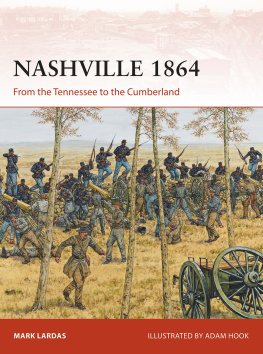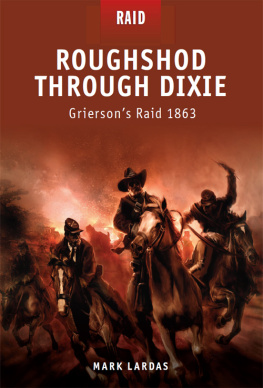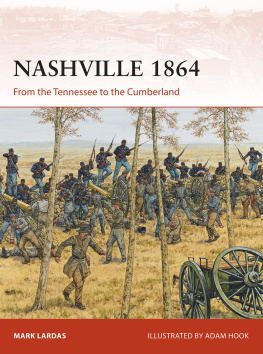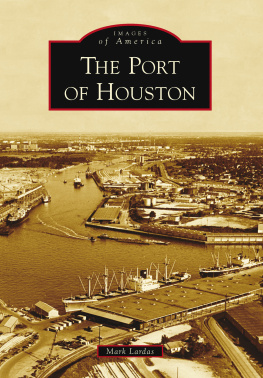Mark Lardas - Nashville 1864
Here you can read online Mark Lardas - Nashville 1864 full text of the book (entire story) in english for free. Download pdf and epub, get meaning, cover and reviews about this ebook. year: 2017, publisher: Bloomsbury Publishing, genre: History. Description of the work, (preface) as well as reviews are available. Best literature library LitArk.com created for fans of good reading and offers a wide selection of genres:
Romance novel
Science fiction
Adventure
Detective
Science
History
Home and family
Prose
Art
Politics
Computer
Non-fiction
Religion
Business
Children
Humor
Choose a favorite category and find really read worthwhile books. Enjoy immersion in the world of imagination, feel the emotions of the characters or learn something new for yourself, make an fascinating discovery.
- Book:Nashville 1864
- Author:
- Publisher:Bloomsbury Publishing
- Genre:
- Year:2017
- Rating:4 / 5
- Favourites:Add to favourites
- Your mark:
- 80
- 1
- 2
- 3
- 4
- 5
Nashville 1864: summary, description and annotation
We offer to read an annotation, description, summary or preface (depends on what the author of the book "Nashville 1864" wrote himself). If you haven't found the necessary information about the book — write in the comments, we will try to find it.
Nashville 1864 — read online for free the complete book (whole text) full work
Below is the text of the book, divided by pages. System saving the place of the last page read, allows you to conveniently read the book "Nashville 1864" online for free, without having to search again every time where you left off. Put a bookmark, and you can go to the page where you finished reading at any time.
Font size:
Interval:
Bookmark:

I would like to dedicate this book to Marcus Cowper, my long-time editor at Osprey. He persuaded me past my reluctance to submit my first book proposal to Osprey. Without his encouragement I doubt there would have been one Osprey book written by me, much less 20.
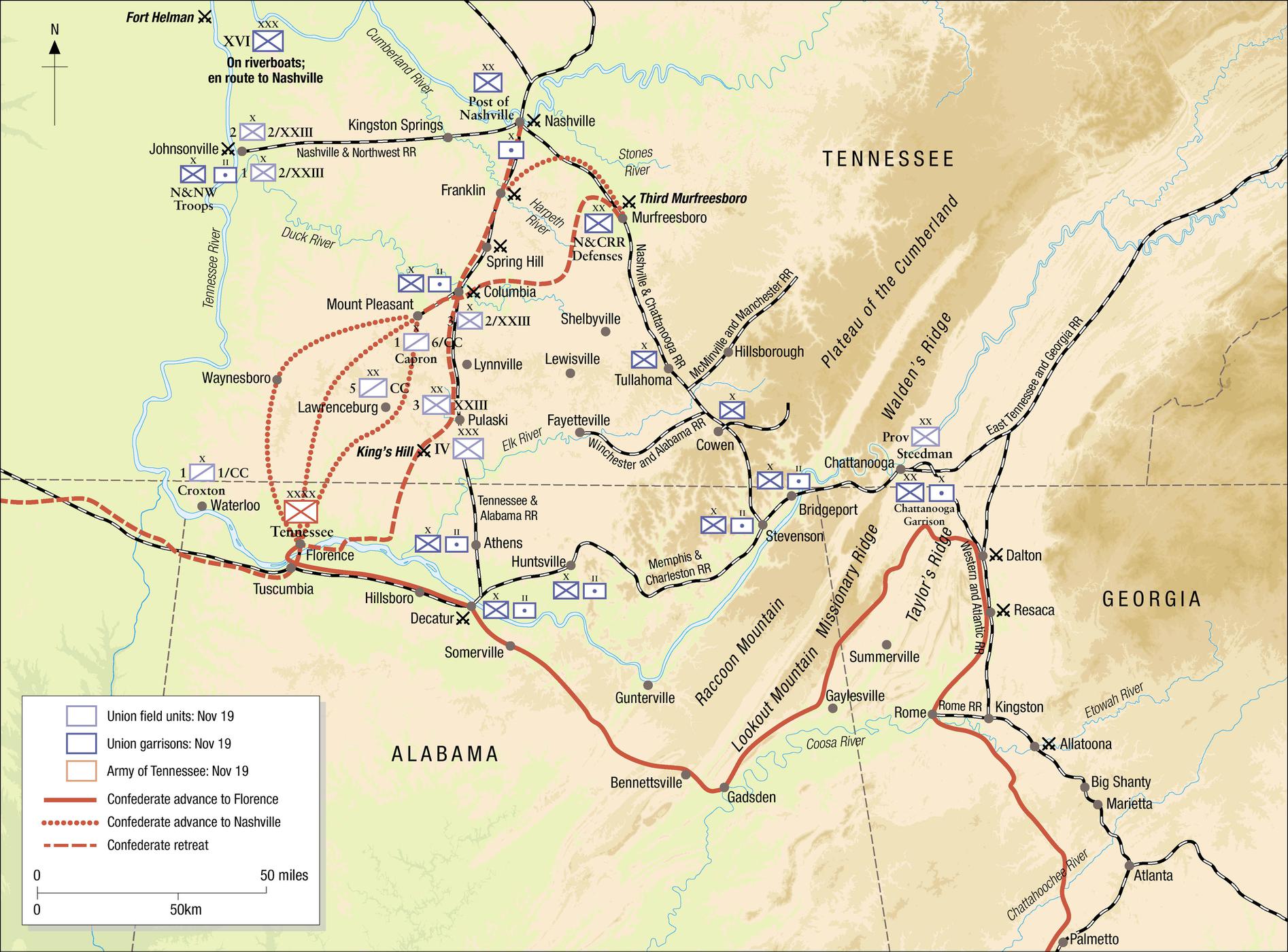
The Nashville Campaign, 1864
Late September of 1864 found John Bell Hood contemplating Atlanta. Hood commanded the Confederacys Army of Tennessee. It held responsibility for defending the Confederate States of Americas heartland, the territory between the Appalachian Mountains and the Mississippi basin. As the name implied, it originated in Tennessee, covering the central and eastern parts of the state.
In the previous year, the Army of Tennessee had been chased out of Tennessee into northern Georgia by the Army of the Cumberland. A Confederate victory at Chickamauga brought the Confederates back into its namesake state, almost delivering Chattanooga into their hands. A dogged rearguard action at Chickamauga by a Union corps commander, George Thomas, and an equally tenacious defense of Chattanooga by Thomas after he was given command of the Army of the Cumberland, prevented the Confederates from taking Chattanooga.
Then General Ulysses Grant brought reinforcements, and broke the Siege of Chattanooga. In the process, Grant broke the Army of Tennessee, which was hurled back into Georgia. Grant also brought two corps from the Army of the Potomac and the Unions Army of the Tennessee, with its fiery tempered, red-headed commander, William T. Sherman.
Over the subsequent months, the Union and Confederate armies fought over northern Georgia. Sherman, who replaced Grant in command of the Military Division of the Mississippi, battled his way towards Atlanta, the central Confederacys most important railroad junction and its largest remaining manufacturing center. Shermans progress was impeded by Joseph Johnsons Fabian tactics. But Jefferson Davis, President of the Confederacy, was dissatisfied with Johnsons unwillingness to stand up and fight Shermans advancing army. Davis replaced Johnson with Hood, a man known for pugnacity.
Hood proved pugnacious, challenging Sherman directly. The change of strategy allowed Sherman to grapple the formerly elusive Confederates, using the frontal assaults launched by Hood to batter the Army of Tennessee. Sherman soon had Atlanta under siege. On September 2, Hood ordered the weakened Confederate forces withdrawn from Atlanta. The next day, after the Union Army occupied the city, Sherman telegraphed a dispatch to Army Chief of Staff Henry Halleck, which included the words, So Atlanta is ours, and fairly won.
Three weeks later, Hood was still trying to dispute that result. Hoods inclination, as always, was to attack. However, Hood lacked the strength to force Sherman out of Atlanta, whether by direct assault or siege. Nor could he hope to stop Sherman if Sherman moved south. Sherman commanded the Military Division of the Mississippi. It included the Army of the Tennessee, the Army of the Cumberland, and the Army of the Ohio. Shermans forces in and around Atlanta by themselves, 70,000 men, outnumbered the Confederacys Army of Tennessee by two to one.
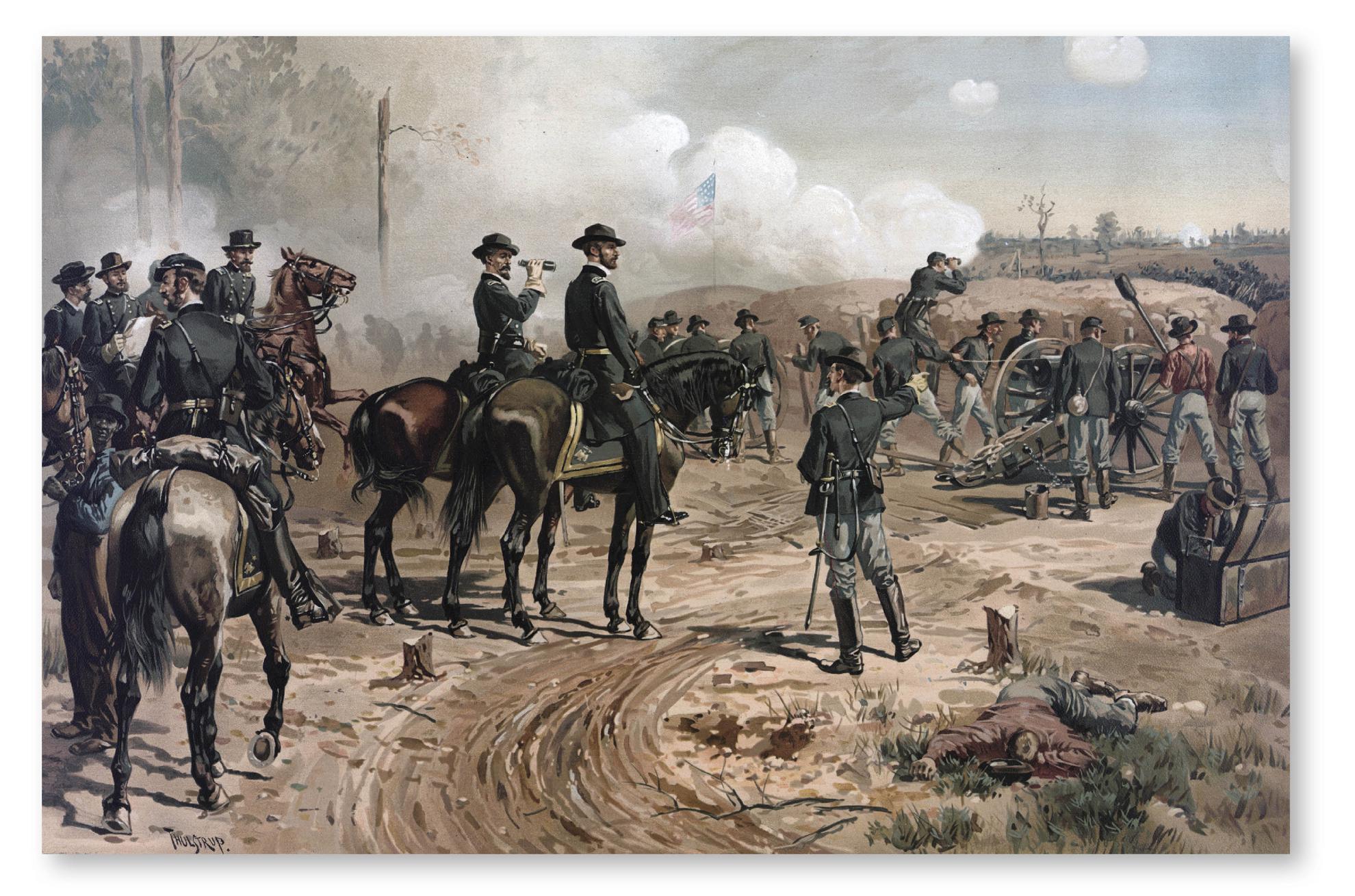
The fall of Atlanta virtually guaranteed Lincoln would win the 1864 Presidential election. It offered the Confederacy a stark choice: admit the war was lost, or develop a new strategy for winning it. Hoods plan to invade Tennessee grew from that need. (Library of Congress)
The Military Division of the Mississippi contained another 50,000 men scattered through central Tennessee and northern Alabama and Georgia, which could concentrate on Hood if Shermans Atlanta troops got pinned down by him. Hood suspected Sherman wanted the Army of Tennessee to get trapped by one more attack on Shermans forces in Atlanta, to be crushed between the two parts of Shermans command.
Hood still wanted to attack. Instead of attacking Atlanta, Hood decided to attack Shermans lines of supply and communications. Atlanta was at the end of a long, narrow supply line. Food, ammunition, and supplies for Shermans army had to come by rail or river from the North. The railroad from Chattanooga to Atlanta covered 138 miles, and the Yankees could not guard all of it. Destroy this rail link and Sherman would have to withdraw.
As Hood would discover over the next two weeks, this seemingly simple task was difficult to accomplish. Attacking fortified depots cost casualties Hood could ill afford. It was also risky. If the Rebels remained in any spot too long, Sherman could send enough of his army to crush Hoods forces without loosening the Norths hold on Atlanta. Nor did destroying open track help. As quickly as Hood tore up tracks, Shermans engineers repaired them.
More galling for Hood, it seemed Sherman was ignoring Hoods efforts, planning something else. Initially, Sherman had chased Hood, but had broken off the pursuit of the faster-moving Confederates. Hood needed a new strategy.
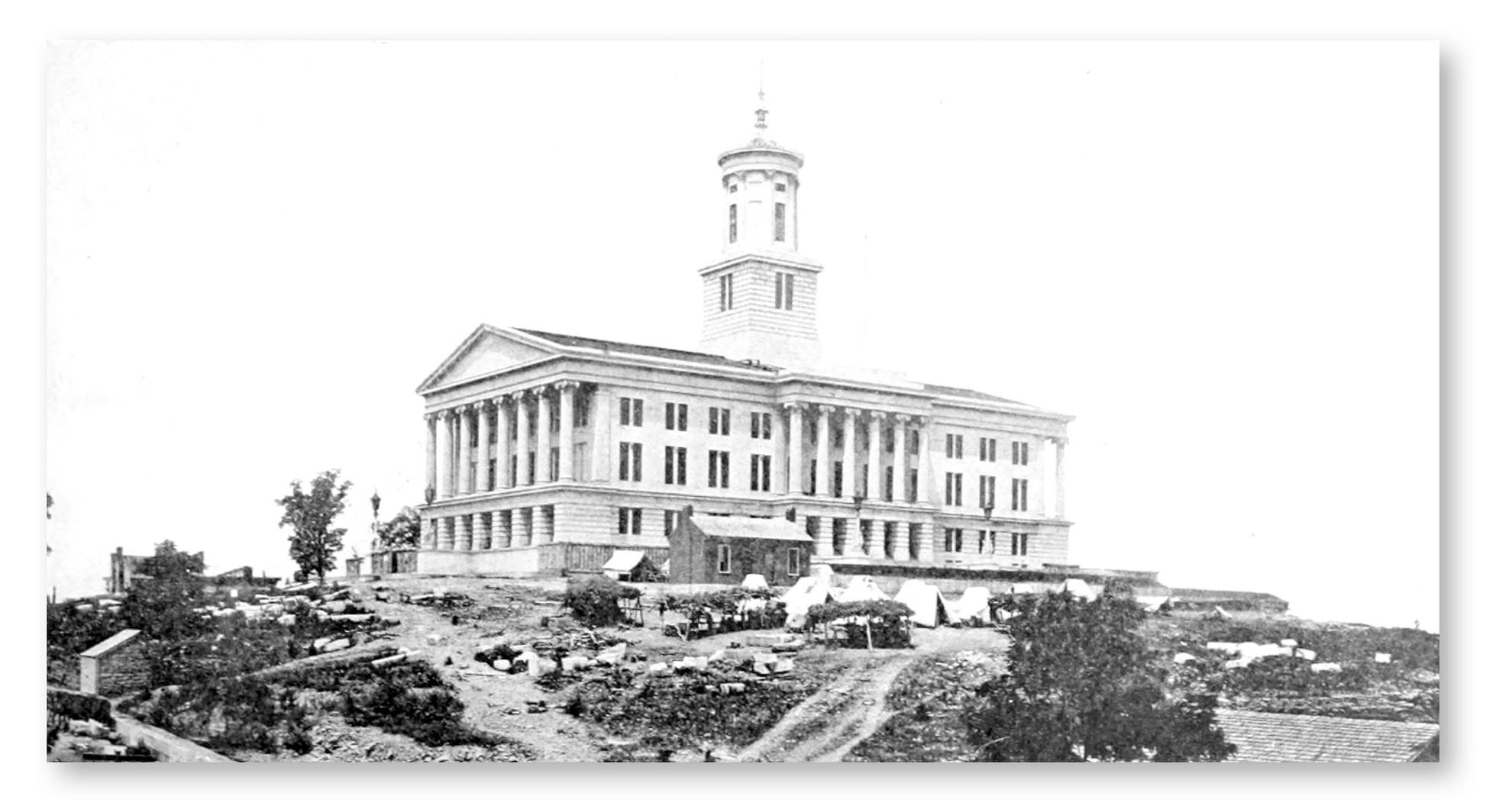
The Tennessee state capitol in Nashville. Hood believed taking it would rally support for the Confederacy in Tennessee. Thomas needed Nashville as a supply center as much as to deny it as a Confederate prize. (Authors collection)
If attacking the railroad between Chattanooga and Atlanta could not force Sherman from Atlanta, perhaps the answer lay further north. Union supply lines also ran through Tennessee, following the Tennessee and Cumberland rivers or the 150 miles of track connecting Chattanooga, Tennessee with Nashville, Tennessee. Nashville was also the capital of Tennessee. With the exception of Virginia, Tennessee was the Confederacys most important state. A Confederate invasion of Tennessee by its namesake Army of Tennessee was bound to force the North to react. It would also make Atlanta untenable. If Hood succeeded in liberating Nashville, the act might even turn the tides of wars to favoring the Confederacy again.
So Hood moved north, invading Tennessee. A three-month campaign followed, one that confounded the expectations of both sides. Hood lost Joe Wheelers cavalry corps, but it was replaced by Bedford Forrests cavalry corps. Instead of fighting Sherman and his army, the Confederate Army of Tennessee found itself fighting a different enemy: the garrison troops already in Tennessee, plus the troops Sherman did not want on his planned march through Georgia (a mixed bag which contained a corps from each of the three armies Sherman commanded, plus soldiers separated from the units accompanying Sherman). Instead of continuing the fight against Sherman, Hood found himself opposed by George R. Thomas, a phlegmatic general temperamentally different from both the aggressive Hood and the mercurial Sherman.
Central Tennessee, so often the seat of combat during the Civil War, would host one final campaign before the war ended. It ran for 16 tumultuous weeks, starting south of the Tennessee River and ending on the Cumberland Rivers southern bank. It began with the hope the Confederacy could recapture the capital city of Tennessee and perhaps even Kentucky. It ended with the destruction of a Confederate Army; the only time during the war a Union general destroyed a Confederate Army in battle.
Font size:
Interval:
Bookmark:
Similar books «Nashville 1864»
Look at similar books to Nashville 1864. We have selected literature similar in name and meaning in the hope of providing readers with more options to find new, interesting, not yet read works.
Discussion, reviews of the book Nashville 1864 and just readers' own opinions. Leave your comments, write what you think about the work, its meaning or the main characters. Specify what exactly you liked and what you didn't like, and why you think so.

